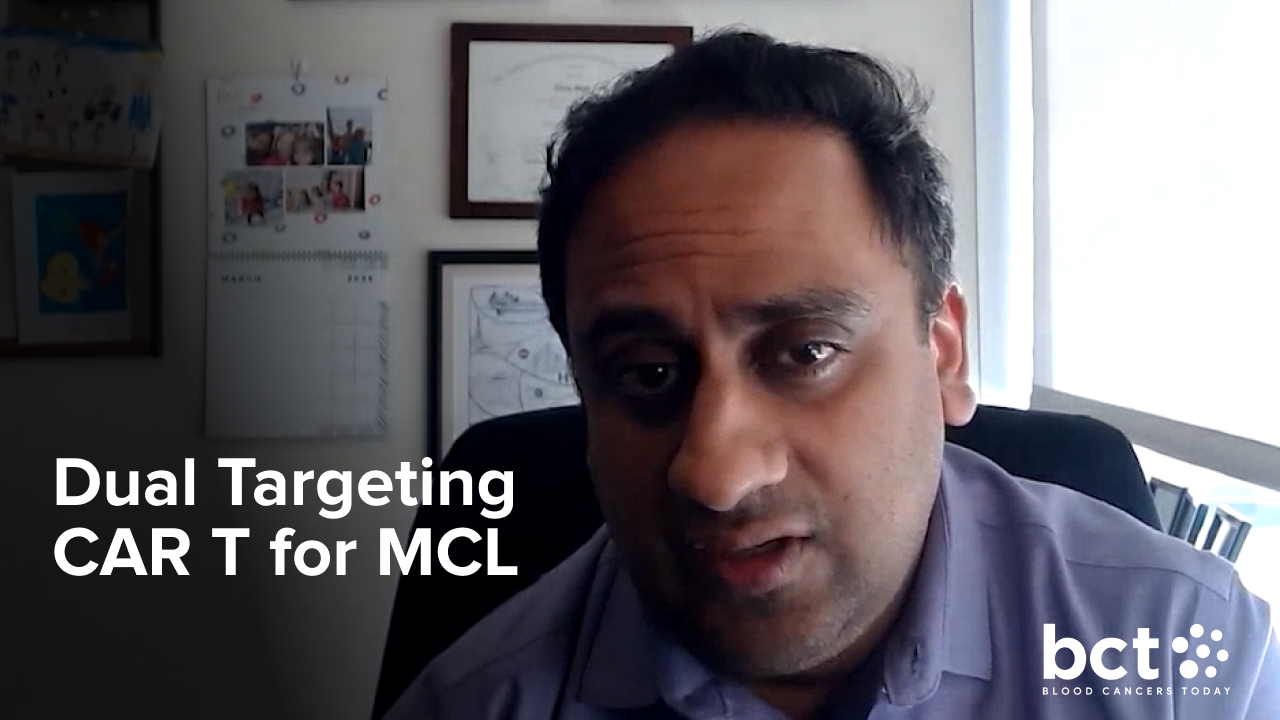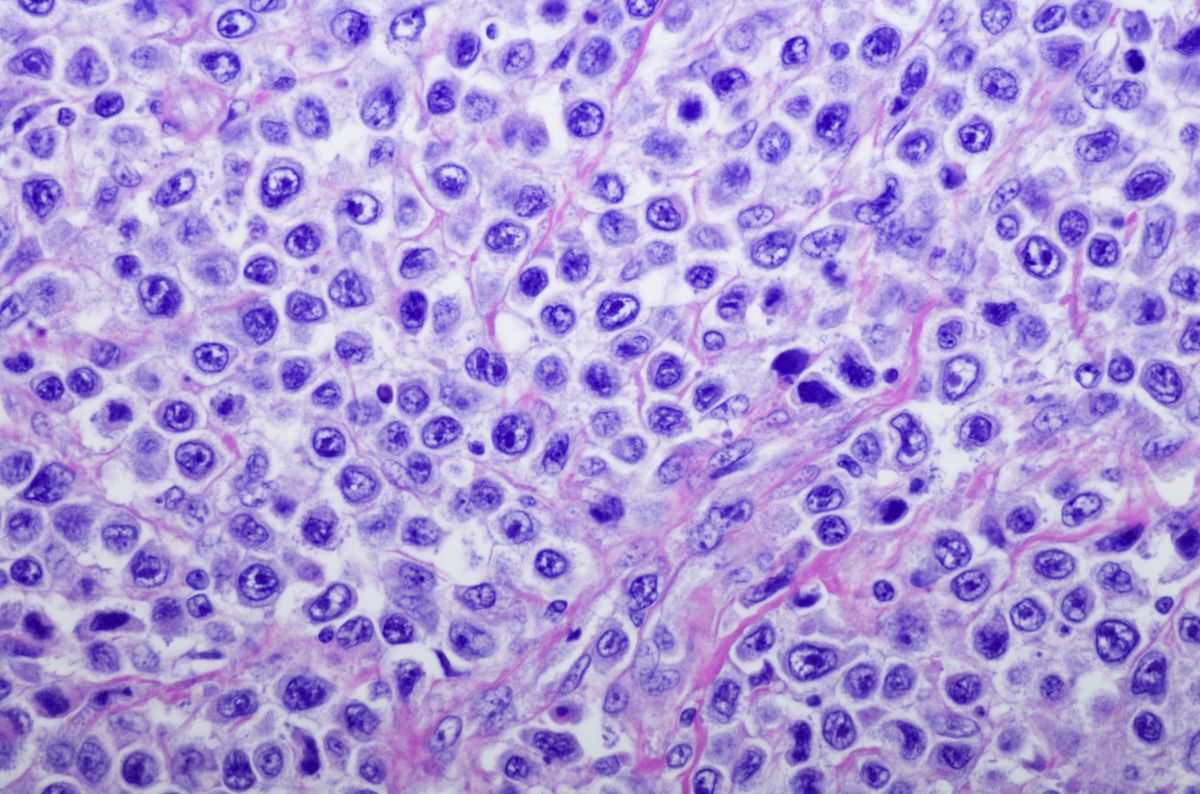
LV20.19, a chimeric antigen receptor (CAR) T-cell product that targets CD19 and CD20 “may improve outcomes” in patients with relapsed or refractory mantle cell lymphoma (MCL), according to a recent study.
Nirav Shah, MD, of the Medical College of Wisconsin, and colleagues conducted the research and presented its results during the 2023 Tandem Transplantation & Cellular Therapy Meetings of ASTCT and CIBMTR.
They conducted the research because the approved CD19-directed CAR T-cell therapy for relapsed or refractory MCL is “effective but limited by relapse and high rates of grade [3-positive] cytokine release syndrome (CRS) and immune effector cell-associated neurotoxicity syndrome (ICANS).”
Dr. Shah and colleagues hypothesized that lentiviral bispecific CAR T-cells targeting CD20 and CD19 B-cell antigens with 4-1BB co-stimulatory signaling will “improve clinical outcomes” in relapsed or refractory MCL “while minimizing toxicity.”
They conducted a phase I/II single-center prospective trial evaluating LV20.19 CAR T cells at a fixed dose of 2.5 × 10e6 cells/kg for patients with MCL. The LV20.19 CAR T cells were manufactured on site using the CliniMACS Prodigy device with interleukin (IL)-7/IL-15 for cell expansion.
“After safety run-in for patients with B-cell [non-Hodgkin lymphoma], we opened a 14-patient single-stage phase II MCL arm with flexible eight/12-day [manufacturing] and goal of fresh infusion,” Dr. Shah and colleagues wrote.
To date, 11 patients with MCL received LV20.19 CAR T cells at the target dose of 2.5 × 10e6 cells/kg, with nine of the patients receiving eight-day manufactured CAR-T and two patients receiving a 12-day product. Manufacturing was “successful” in all patients, all of whom received a fresh, noncryopreserved infusion, according to the researchers.
The median patient age was 63 years, with a median of four prior lines of therapy. Of the 11 patients, nine had progressed on a Bruton’s tyrosine kinase (BTK) inhibitor and four of these patients also progressed on a noncovalent BTK inhibitor administered on a clinical trial.
LV20.19 CAR T cells produced in the CliniMACS Prodigy had “robust expansion” with a mean of 5.2 × 10e8 CAR T cells obtained on day seven of manufacturing, according to Dr. Shah and colleagues.
The overall response rate (ORR) was 100% at day 28, with a complete response in 64% and a partial response in the remaining 36%. Of the 10 patients who were assessed for minimal residual disease (MRD) between days 28-60 after receiving CAR-T, 70% were MRD negative by the ClonoSEQ assay.
The one-year cumulative incidence of relapse was 0%, while the one-year cumulative incidence of nonrelapse morality was 9%. The one-year progression-free survival rate was 91%, as was the one-year overall survival rate.
With a median follow-up of 20 months among the surviving patients, none of the patients relapsed. One nonrelapse morality occurred due to gram-negative sepsis after the day 28 evaluation.
All patients had grade 1 to grade 2 CRS, while two patients had immune effector cell-associated neurotoxicity syndrome, one of grade 2 and one of grade 3.
Dr. Shah and colleagues concluded that “bispecific LV20.19 CAR T-cells expanded with IL7/IL15 are safe and efficacious” for patients with relapsed or refractory MCL, noting that the ORR was 100%, with no relapses at a median follow-up of >1.5 years.
Furthermore, “all [patients] on the phase II arm had CAR T-cells manufactured on site in eight days with fresh CAR T-cell infusion and lymphodepletion starting during [manufacturing],” Dr. Shah and colleagues wrote. “Dual targeting of CD19 and CD20 with CAR-T cells may improve outcomes in [patients] with [relapsed or refractory] MCL.
Reference
Shah N, Furqan F, Szabo A, et al. Results from a phase 1/2 study of tandem, bispecific anti-CD20/anti-CD19 (LV20.19) CAR T-cells for mantle cell lymphoma. Abstract #40. Presented at the 2023 Tandem Meetings of ASTCT and CIBMTR; February 15-19, 2023; Orlando, FL.






 © 2025 Mashup Media, LLC, a Formedics Property. All Rights Reserved.
© 2025 Mashup Media, LLC, a Formedics Property. All Rights Reserved.